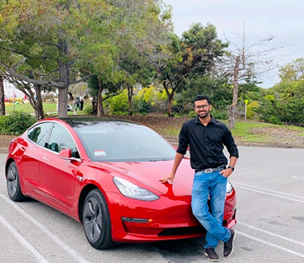Driving Innovation in Hardware: Shivkumar Chauhan's Journey to the Forefront of Hardware Engineering

Shivkumar Chauhan, an alumnus of BITS Pilani (Goa Campus,’12), earned a Bachelor's degree in Electrical and Electronics Engineering. He further pursued a Master's in Engineering and Computer Engineering from Georgia Institute of Technology, where he specialized in Computer Architecture and VLSI (Very Large Scale Integration). Mr. Chauhan has worked at Qualcomm and NVIDIA and is currently a staff hardware Engineer at Tesla.
Could you outline a roadmap for students interested in pursuing higher education abroad? How to navigate the various prerequisite tests required to do so?
I would say that a student should know whether they want to pursue higher education as early as possible. In your third year, you should have narrowed down the top universities in your desired field of study. You should look into resumes that have been accepted into the university of your choice to understand what the university looks for in prospective students. By the second semester of your third year, you should start preparing for TOEFL and GRE, which are mandatory if you want to study abroad. GRE is an intensive exam that requires an immense amount of practice–especially the vocabulary part of the test, which can include memorizing up to 1000+ words. I used the app Memrise, which helped me learn new words through mnemonic memes. The other parts of the test, which include verbal reasoning and maths, should be more manageable for BITSians. Studying from the official book for the GRE is a must. TOEFL is easier than the GRE and requires very little preparation if you have already studied for it.
Students in the Electrical Engineering department often face the dilemma of whether to pivot to Computer Science roles that offer better opportunities. What are your thoughts on this?
While good core job opportunities exist in India, the best career prospects - without pursuing higher education - are likely to be found in the tech industry. However, there is huge potential in the core engineering industry, with the semiconductor industry being the backbone of the advancements in AI and supercomputers. While silicon engineers are heavily sought after right now, with better opportunities than core engineers, I feel this situation will only improve in the next 5 to 10 years.
Are there any courses that students at BITS should take to deepen their industry knowledge?
Computer programming, data structures, and algorithms are essential courses for everyone, whether you're pursuing software engineering or a core engineering field. If you're in the Electrical Engineering department, I recommend taking courses in digital design, computer architecture, and VLSI design. Computer architecture is also an important course for everyone, regardless of your department. Core courses in all disciplines are enough to deepen your understanding and give you a good platform for building your career in that core industry.
You had a stellar academic performance with a 4.0 GPA during your postgrad and a 9.33 CGPA at BITS. How did you maintain this consistency in your academics over six years?
During my undergrad, I found the courses engaging; that enthusiasm was reflected in my CGPA. It motivated me to put in extra effort before exams, which helped contribute to my academic performance. While almost everyone has an undergraduate degree, those who pursue a master's degree are truly passionate about what they are studying and have something motivating them. So, it's easier to maintain an academic record during a master’s, and your GPA reflects how much effort you put in.
What's been the most rewarding project or milestone in your career so far?
The most rewarding experience in my career has been being an early member of a team working on cutting-edge AI and machine training and being at the forefront of the technological revolution. I feel like I was at the right place at the right time, and it gave me invaluable exposure to silicon design and semiconductors. That experience not only deepened my expertise but also opened up numerous opportunities.
What motivated you to switch from Tesla to NVIDIA and back to Tesla over eight months?
I found a slightly better opportunity than the other, which gave me faster career growth. If someone offers you a chance that you cannot miss out on in terms of responsibilities and career growth, then you think twice and do what's best for yourself.
Many students are unsure about their next steps after graduating from BITS. What advice would you give them when deciding between pursuing a Master’s degree or gaining work experience?
If one is interested in gaining in-depth knowledge about what they have already studied during their undergraduate years, one should pursue a master's degree right after undergrad. This will give them an edge over those without further studies when they enter the industry.
If a student needs to polish their profile to boost their chances of landing a good job or getting into a suitable foreign university for postgrad, then work experience is the way to go. Working beforehand will also give you an advantage when getting placements and internships during your Master’s.
Could you share some of your memorable experiences at BITS?
My undergrad years were the golden years. I had a big group of friends with whom I would stay up late at night talking and playing poker. Being from the Goa campus, we often hung out at beaches. I’m still in touch with many of them, especially since many have moved to the US.
You Might Also Like
- Trailblazing Success: Sudarshan Ravichandran’s Journey from BITS Pilani to Global Impact
- From BITS to NVIDIA: Mohit Garg on Exploring Electronics, AI, and the Power of Lifelong Learning
- From BITS Pilani to UCLA, Oracle to Goldman Sachs, and now at Morgan Stanley, Deepak Agrawal’s journey in tech is as dynamic as the stories he discovers through reading.
- Discover More with BITSology!
- Goa to Goldman Sachs: Sahili Totale’s Road to Financial Excellence


 An Institute of Eminence
An Institute of Eminence






